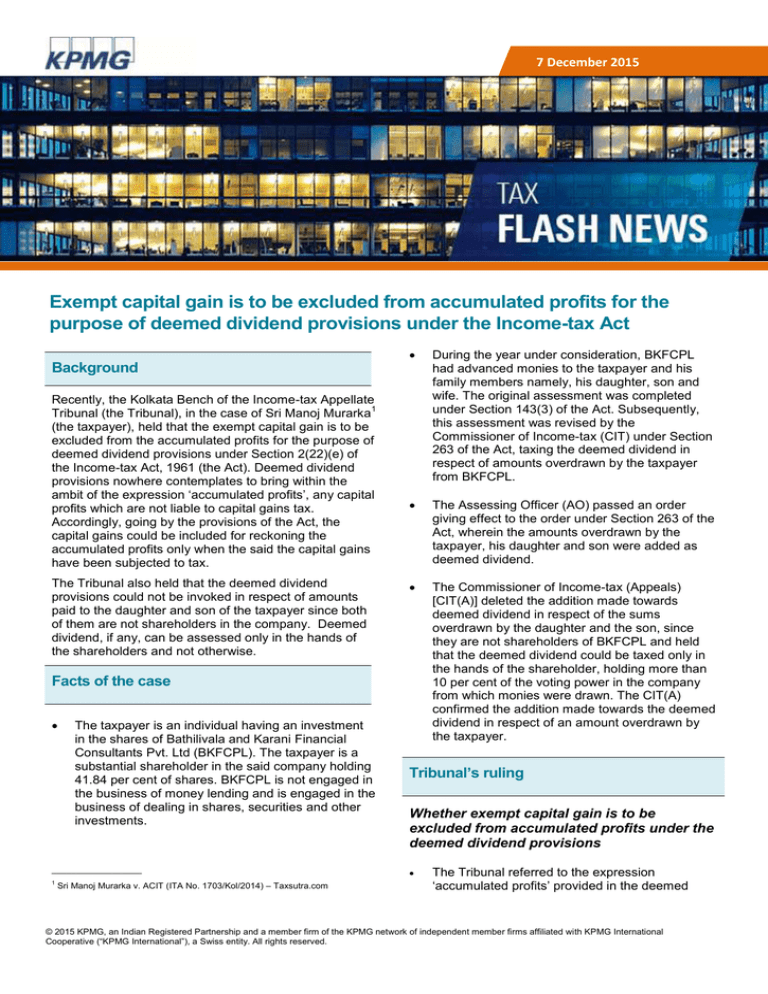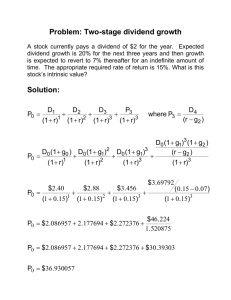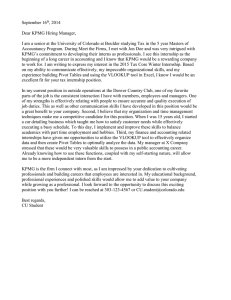
KPMG FLASH NEWS
7 December 2015
KPMG in India
Exempt capital gain is to be excluded from accumulated profits for the
purpose of deemed dividend provisions under the Income-tax Act
During the year under consideration, BKFCPL
had advanced monies to the taxpayer and his
family members namely, his daughter, son and
wife. The original assessment was completed
under Section 143(3) of the Act. Subsequently,
this assessment was revised by the
Commissioner of Income-tax (CIT) under Section
263 of the Act, taxing the deemed dividend in
respect of amounts overdrawn by the taxpayer
from BKFCPL.
The Assessing Officer (AO) passed an order
giving effect to the order under Section 263 of the
Act, wherein the amounts overdrawn by the
taxpayer, his daughter and son were added as
deemed dividend.
The Commissioner of Income-tax (Appeals)
[CIT(A)] deleted the addition made towards
deemed dividend in respect of the sums
overdrawn by the daughter and the son, since
they are not shareholders of BKFCPL and held
that the deemed dividend could be taxed only in
the hands of the shareholder, holding more than
10 per cent of the voting power in the company
from which monies were drawn. The CIT(A)
confirmed the addition made towards the deemed
dividend in respect of an amount overdrawn by
the taxpayer.
Background
Recently, the Kolkata Bench of the Income-tax Appellate
1
Tribunal (the Tribunal), in the case of Sri Manoj Murarka
(the taxpayer), held that the exempt capital gain is to be
excluded from the accumulated profits for the purpose of
deemed dividend provisions under Section 2(22)(e) of
the Income-tax Act, 1961 (the Act). Deemed dividend
provisions nowhere contemplates to bring within the
ambit of the expression ‘accumulated profits’, any capital
profits which are not liable to capital gains tax.
Accordingly, going by the provisions of the Act, the
capital gains could be included for reckoning the
accumulated profits only when the said the capital gains
have been subjected to tax.
The Tribunal also held that the deemed dividend
provisions could not be invoked in respect of amounts
paid to the daughter and son of the taxpayer since both
of them are not shareholders in the company. Deemed
dividend, if any, can be assessed only in the hands of
the shareholders and not otherwise.
Facts of the case
The taxpayer is an individual having an investment
in the shares of Bathilivala and Karani Financial
Consultants Pvt. Ltd (BKFCPL). The taxpayer is a
substantial shareholder in the said company holding
41.84 per cent of shares. BKFCPL is not engaged in
the business of money lending and is engaged in the
business of dealing in shares, securities and other
investments.
__________________
1
Sri Manoj Murarka v. ACIT (ITA No. 1703/Kol/2014) – Taxsutra.com
Tribunal’s ruling
Whether exempt capital gain is to be
excluded from accumulated profits under the
deemed dividend provisions
The Tribunal referred to the expression
‘accumulated profits’ provided in the deemed
© 2015 KPMG, an Indian Registered Partnership and a member firm of the KPMG network of independent member firms affiliated with KPMG International
Cooperative (“KPMG International”), a Swiss entity. All rights reserved.
2
dividend provisions . It is pertinent to note that for
the purposes of artificial categories of dividends
which are created by the provisions of Section 2(22)
of the Act, the accumulated profits do not include
any capital gains, except those which are taxable as
such.
Thus, accumulated profits would neither include
capital gains made during a period when they are
not taxable under the Act, nor capital gains which
are not chargeable even during the period that the
capital gains tax is in force. Consequently, any
payment made to a shareholder of a company of
exempt capital gains of the company would not be a
3
dividend. The Tribunal relied on various decisions .
It has been held that the legal fiction created in
Explanation 2 to Section 2(22) of the Act that
‘accumulated profits’ shall include all profits of the
company upto the date of distribution or payment
should be understood to include the current year
profits of the company and not otherwise.
In other words, for reckoning the accumulated
profits, apart from the opening balance of
accumulated profits, the profits earned in the current
year also are to be added and then the total
accumulated profits should be considered for the
purpose of calculation of dividend out of the
accumulated profits, if any.
The deemed dividend provisions nowhere
contemplates to bring within the ambit of the
expression ‘accumulated profits’, any capital profits
which are not liable to the capital gains tax.
Accordingly, even going by the provisions of the
statute, it can be concluded that capital gains could
be included for reckoning the accumulated profits
only when the said capital gains has been duly
subjected to tax.
In the present case, the capital gains derived by the
company was exempt and hence the same should
not be included in the accumulated profits, and if the
same is excluded, then there are only negative
accumulated profits available with the company.
Admittedly, the provisions of Section 2(22)(e) of the
Act could be invoked only to the extent of the
company possessing accumulated profits. In the
absence of accumulated profits, there was no scope
for making any addition towards deemed dividend.
The exempted capital gains shall not enter the
stream of the expression ‘accumulated profits’
and the BKFCPL has got only negative
accumulated profits after exclusion of the
exempted capital gains and hence the provisions
of Section 2(22)(e) of the Act cannot be invoked
in the facts and circumstances of the case.
Applicability of deemed dividend provisions
where amounts are overdrawn by the
daughter and son
The AO had gone beyond the jurisdiction vested
on him by the order of the CIT under Section 263
of the Act, by treating the amounts overdrawn by
the son and daughter of the taxpayer as deemed
dividend.
The decision in the case of L. Alagusundaram
4
Chettiar relied on by the tax department was
distinguishable to the facts of the present case.
In that case, the monies were advanced by the
company to one employee who in turn transferred
the same to the shareholder of the company.
Whereas in the present case, the monies were
advanced directly by the company to the son and
daughter of the taxpayer, and it was not the case
of the tax department that the monies were
subsequently transferred by the son and daughter
to the taxpayer and the children merely acted as
a conduit to draw monies from the company for
onward transmission to the taxpayer.
The Tribunal relied on the decision of C.P.Sarathy
5
Mudaliar and held that the provisions of Section
2(22)(e) of the Act creates a deeming fiction and
hence needs to be viewed strictly. It was also
observed that both the son and daughter of the
taxpayer were not shareholders in BKFCPL and
hence the deemed dividend, if any, could be
assessed only in the hands of the shareholders
and not otherwise.
Accordingly, it was held that the provisions of
Section 2(22)(e) of the Act could not be invoked
in respect of amounts paid to the daughter and
son, irrespective of whether there are
accumulated profits in the instant case or not and
whether exempted capital gains is to be included
or excluded for reckoning the accumulated profits
or not.
____________
2
As per the Explanation 2 to Section 2(22) of the Act, the expression
‘accumulated profits’ shall include all profits of the company upto the date of
distribution or payment referred to in the provisions………..
As per the Explanation 1 to Section 2(22) of the Act, it states as below the
expression ‘accumulated profits', wherever it occurs in this clause, shall not
include capital gains arising before 1 April 1946, or after 31 March 1948, and
before 1 April 1956.
3
CIT v. Mangesh J Sanzgiri [1979] 119 ITR 962 (Bom), Smt. Chechamma
Thomas v. CIT [1986] 161 ITR 718 (Ker), ACIT v. Gautam Sarabhai Trust No. 23
[2002] 81 ITD 677 (Ahd)
____________
4
5
L. Alagusundaram Chettiar v. CIT [2001] 252 ITR 893 (SC)
CIT v. C.P.Sarathy Mudaliar [1972] 83 ITR 170 (SC)
© 2015 KPMG, an Indian Registered Partnership and a member firm of the KPMG network of independent member firms affiliated with KPMG International
Cooperative (“KPMG International”), a Swiss entity. All rights reserved.
Our comments
In the instant case, the Kolkata Tribunal held that the
exempt capital gain is to be excluded from accumulated
profits for the purpose of deemed dividend provisions
under the Act. The Tribunal also held that deemed
dividend provisions cannot be invoked in respect of
amounts paid to the daughter and son since both of
them are not shareholders in the company. Deemed
dividend, if any, could be assessed only in the hands of
the shareholders and not otherwise.
© 2015 KPMG, an Indian Registered Partnership and a member firm of the KPMG network of independent member firms affiliated with KPMG International
Cooperative (“KPMG International”), a Swiss entity. All rights reserved.
www.kpmg.com/in
Ahmedabad
Commerce House V, 9th Floor,
902 & 903, Near Vodafone House,
Corporate Road,
Prahlad Nagar,
Ahmedabad – 380 051
Tel: +91 79 4040 2200
Fax: +91 79 4040 2244
Bengaluru
Maruthi Info-Tech Centre
11-12/1, Inner Ring Road
Koramangala, Bangalore 560 071
Tel: +91 80 3980 6000
Fax: +91 80 3980 6999
Chandigarh
SCO 22-23 (Ist Floor)
Sector 8C, Madhya Marg
Chandigarh 160 009
Tel: +91 172 393 5777/781
Fax: +91 172 393 5780
Chennai
No.10, Mahatma Gandhi Road
Nungambakkam
Chennai 600 034
Tel: +91 44 3914 5000
Fax: +91 44 3914 5999
Delhi
Building No.10, 8th Floor
DLF Cyber City, Phase II
Gurgaon, Haryana 122 002
Tel: +91 124 307 4000
Fax: +91 124 254 9101
Mumbai
Lodha Excelus, Apollo Mills
N. M. Joshi Marg
Mahalaxmi, Mumbai 400 011
Tel: +91 22 3989 6000
Fax: +91 22 3983 6000
Hyderabad
8-2-618/2
Reliance Humsafar, 4th Floor
Road No.11, Banjara Hills
Hyderabad 500 034
Tel: +91 40 3046 5000
Fax: +91 40 3046 5299
Noida
6th Floor, Tower A
Advant Navis Business Park
Plot No. 07, Sector 142
Noida Express Way
Noida 201 305
Tel: +91 0120 386 8000
Fax: +91 0120 386 8999
Kochi
Syama Business Center
3rd Floor, NH By Pass Road,
Vytilla, Kochi – 682019
Tel: +91 484 302 7000
Fax: +91 484 302 7001
Kolkata
Unit No. 603 – 604,
6th Floor, Tower – 1,
Godrej Waterside,
Sector – V, Salt Lake,
Kolkata 700 091
Tel: +91 33 44034000
Fax: +91 33 44034199
Pune
703, Godrej Castlemaine
Bund Garden
Pune 411 001
Tel: +91 20 3050 4000
Fax: +91 20 3050 4010
Vadodara
iPlex India Private Limited
1st floor office space
No. 1004, Vadodara Hyper
Dr. V S Marg
Vadodara – 390007
Tel: 0265-2351085 / 2322607
The information contained herein is of a general nature and is not intended to address the circumstances of any particular individual or entity. Although we
endeavor to provide accurate and timely information, there can be no guarantee that such information is accurate as of the date it is received or that it will
continue to be accurate in the future. No one should act on such information without appropriate professional advice after a thorough examination of the
particular situation.
© 2015 KPMG, an Indian Registered Partnership and a member firm of the KPMG network of independent member firms affiliated with KPMG International
Cooperative (“KPMG International”), a Swiss entity. All rights reserved.
The KPMG name, logo and "cutting through complexity" are registered trademarks or trademarks of KPMG International Cooperative ("KPMG International").
This document is meant for e-communications only.
© 2015 KPMG, an Indian Registered Partnership and a member firm of the KPMG network of independent member firms affiliated with KPMG International
Cooperative (“KPMG International”), a Swiss entity. All rights reserved.



